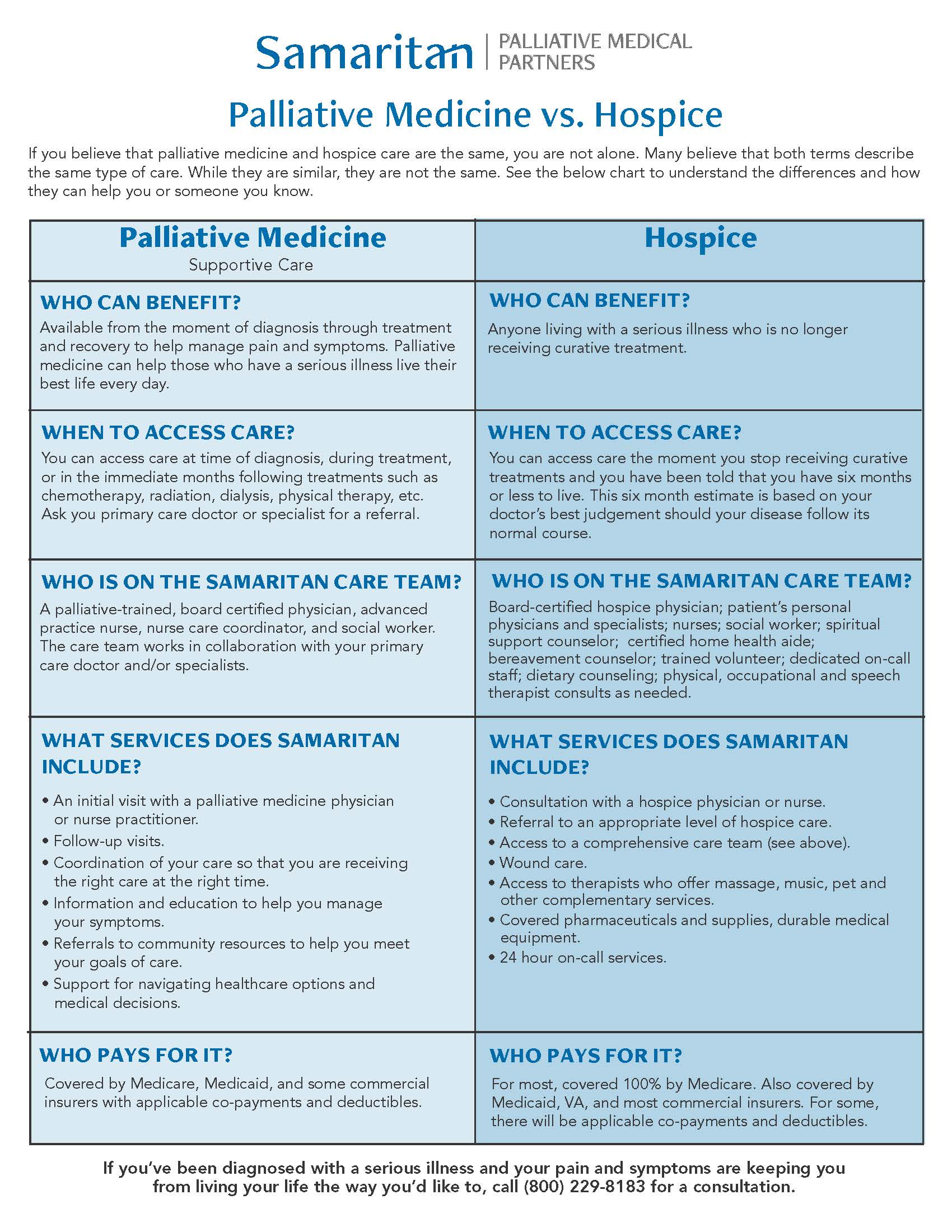Samaritan is a proud provider of Dementia Care and uniquely distinguished as a GUIDE provider by the Centers for Medicare and Medicaid (CMS). Click to learn more.
(856) 596-1600 available 24/7 Refer Now

If you believe that palliative care and hospice care are the same, you are not alone. Many believe that both terms describe the same type of care. While they are similar, they are not the same.

Palliative care and hospice care services:
And both are delivered by a team of professionals – physicians, nurses, social workers, and care coordinators — who can work alongside your regular doctors and/or specialists.
But when is hospice care appropriate vs. palliative care? Let us first answer the following questions: “What is hospice care?” and “What is palliative care?”
Hospice is for anyone living with a serious illness, no longer seeking curative treatment, and whose remaining lifespan is estimated at six months or less. Learn more about hospice care here.
Palliative care is for people at any stage of a serious illness from the time of diagnosis, through treatments, and through end of life. Your condition does not have to be incurable. Learn more about palliative care here.

The primary difference in hospice care versus palliative care is that hospice is for people with six months or less to live or are not exploring curative treatments. Hospice care is a type of palliative (comfort) care and is meant to address your unique needs when living with a terminal illness and to provide comfort, support, and dignity in your final days, weeks, and months of life. Both palliative and hospice care help you if you are living with a variety of medical conditions, such as cancer, heart disease, dementia, stroke, and many others. Both services help you, and those who care about you, live your best life every day.

Palliative care is provided to seriously ill patients at any stage, even from the day of diagnosis and through treatments. It is helpful if you are coping with pain, distressing symptoms, stress, or other serious side effects from your illness or treatments. Hospice care is provided to seriously ill patients who have a six months or less, in their doctor’s best judgment, if the disease follows its normal course.

You are eligible for palliative care if you are living with a serious illness – at any stage — and need solutions for pain, symptoms, and stress of your serious illness, or the treatments to cure or manage it. A palliative care expert will help you understand and navigate your medical options as your illness progresses.
You may be referred at the time of your diagnosis, during treatment (such as chemotherapy, radiation, dialysis, physical therapy, and other interventions), or after treatment has ended.
Palliative care can be provided to someone who may be cured of their disease, a person who will live with their condition for a long time, a person who has a progressive illness , or to a family needing explanations and support in order to make difficult care decisions during routine hospitalizations or times of crisis in the Emergency Department or Intensive Care Unit.
Palliative care is for you if your quality of life is impacted by your illness or treatments to cure or manage it. Are you living with the following: pain, shortness of breath, fatigue, nausea, loss of appetite, difficulty sleeping, and/or anxiety or depression.

Hospice care is available for you or your loved one if you’re considering stopping curative treatments because they aren’t working or the side effects outweigh the benefits. Hospice care is for you if your physician said that you have six months or less to live if your illness follows its normal course.
If you’re still unsure if palliative or hospice is the right choice for you or your loved one, we recommend giving us a call at the number below.
Both palliative and hospice care physicians, nurses, and social workers are trained in having sensitive conversations with patients and families regarding their illness, the treatment and comfort options available at each stage, and working through what care you would want – or not want – if you should become unable to communicate these wishes.

Palliative care includes a palliative-trained, board-certified physician, advance practice nurse, social worker, care coordinators, and dedicated on-call staff, working in collaboration with the your personal physician or specialist.
The hospice care team includes a board-certified hospice physician, your personal physician or specialists, nurse, social worker, spiritual support counselor, certified home health aide, trained volunteer, dedicated on-call staff, dietary counseling, physical, occupational and speech therapist consults as needed.

Palliative care includes consultations in your home or conveniently located outpatients offices, select hospitals, senior living communities, and via telehealth. Visits are covered by Medicare, Medicaid and most commercial insurers with applicable co-pays or deductibles.
Hospice care provides regular visits at your home, assisted living or nursing facility, or inpatient hospice center.

Palliative care is covered by Medicare, Medicaid, and some commercial insurers with applicable co-payments and deductibles.
Hospice care is covered by Medicare, Medicaid, the Veterans Health Administration, and most commercial insurers with applicable co-payments and deductibles; there is a sliding payment scale for the uninsured, and assistance for those with no financial means to access hospice care.

Although there are many differences, palliative and hospice have several things in common. For instance, many people often fear that receiving palliative or hospice care amounts to “giving up.” In fact, the opposite is true.
Palliative and hospice patients have more control over their care — including decisions about what treatments to accept or reject. They aren’t giving up anything; they’re getting an extra layer of support.
A person choosing hospice care has decided the risks or demands of any possible cure outweigh the potential benefits.
Palliative and hospice care help patients shift goals and achieve new priorities – whether that means to continue living at home, spend quality time with family and friends, enjoy favorite activities or hobbies, or make it to important events or milestones.
So instead of “giving up,” patients receiving palliative or hospice care are focusing on what’s most important to them – and making every moment count.
Samaritan offers palliative and hospice care. Here’s a quick comparison between these two programs.

Talk to your family and your doctor about palliative vs. hospice care, as well as your goals. This will help determine whether palliative and/or hospice is the right option for improving your quality of life.